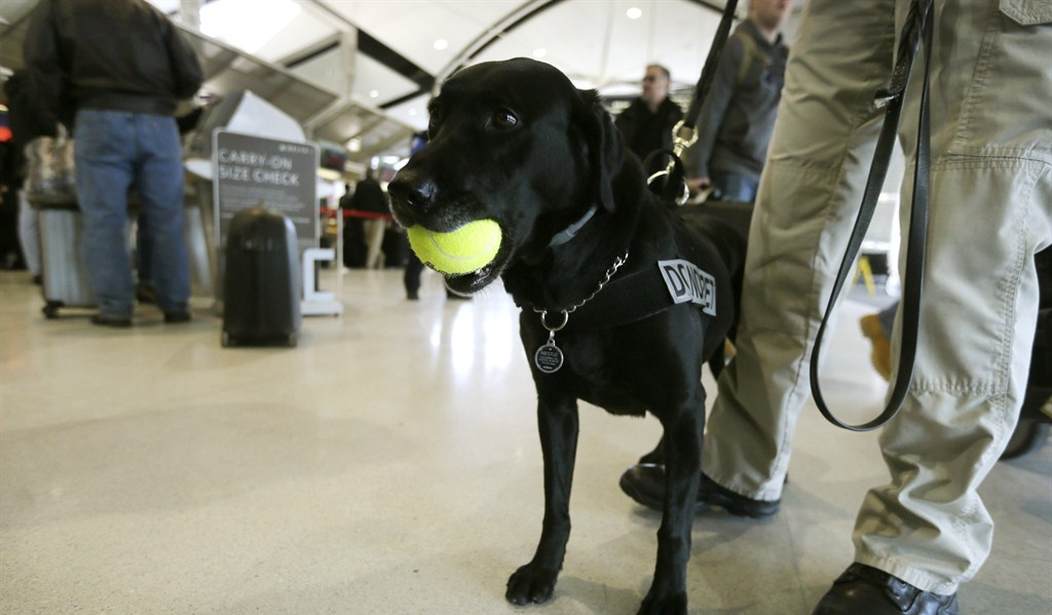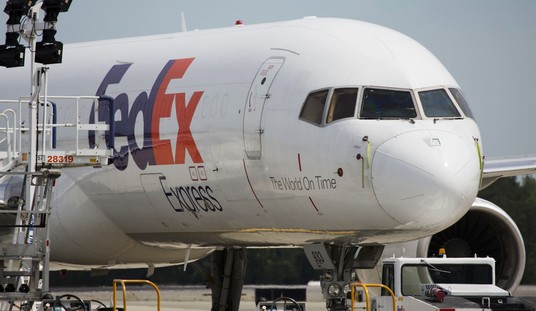You could say this column is going to the dogs! I think because of my recent loss of Miss Maddie Gumdrops, I am more focused on these special animals as a subject, and how we humans rely on and interact with them in the world. For this week's Feel-Good Friday, service dogs, particularly the detection dogs, get a closer look.
Service dogs are usually limited to particular breeds, and I discovered that a majority of them don't come from America. Some of this is because of government regulation; some of it is the inconsistent standards among dog breeding and training; some of it is just cultural. Americans view dogs differently from other places in the world where canines are working animals first and foremost, and pets second.
"Sniffing dogs," those that scent out narcotics, human beings, and explosives are even more specialized. Scientists say that a dog's sense of smell is between 10,000 and 100,000 times more powerful than humans. Ian, who is one of my remaining fur babies, is a hunting dog, and he often sniffs me out. I sometimes wonder what he is detecting and assessing about me through his powerful nose. It is because of this innate ability of scenting and man's skill at focusing it in a particular way that allows companies like 3DK9, which provides detection dogs to individuals, businesses, and venues across the United States, to use them for protection and security: especially for narcotics and explosive detection.
According to 3DK9, three breeds make up the majority of this type of specialty.
Certain breeds have characteristics that make them a better fit for this specialized work before training even begins. For bomb-detection, three stand-out breeds perform better in the field.
German Shepherds are often preferred because they are motivated by "play reward," such as access to a toy.
The second breed, the Labrador Retriever, tends to be more motivated by the "food reward" training method. This can limit the number of drills that a dog handler can perform as the dog loses its hunger. For this reason, meals are usually kept back until after training sessions, and small treats are used for rewards.
The third breed is the Belgian Malinoises/Shepherd. Some breeders are still experimenting to see if they can get the best advantages out of several breeds.
It was in 1986 that the Canine Training Center (CTC) was created to address the overwhelming influx of humans and narcotics on the Southern border. Located at Joint Base San Antonio-Lackland in Texas, the site trains and deploys these highly specialized scent dogs and the canine teams that support the Transportation Security Administration (TSA), and state and local law enforcement. These teams are made up of a canine and a handler, and depending on the agency or municipality, they can have one dog and handler, or a team of several dogs and their handlers, to support the day-to-day activities of protecting communities and transportation systems.
Barring death or severe injury, most of these service dogs give from five to 10 years of service before they are retired. And what a fun retirement party they receive! Over the past few months, the TSA has been promoting the retirement parties for their special dogs. In May, they reported on the retirement of German Shorthaired Pointer, Rex. For five years, Rex and his handler were tasked with protecting and detecting at Mitchell International Airport in Milwaukee.
A 6-year-old detection dog was given a rousing send-off when he retired from duty at Milwaukee's Mitchell International Airport.
Rex, a German shorthaired pointer, was a Transportation Security Administration passenger screening dog for five years and started in Milwaukee with his handler, Regina Eisenberg, in 2023.
On his last day of work, Rex alerted his handler to a smell in a decoy passenger's bag, a ploy that triggered party guests and friends to engulf him in a shower of tennis balls and toys.
Delighted by the surprise retirement party, Rex pranced around, grabbing his gifts and enjoying being petted by guests now that his 'Do Not Pet' patch had been officially removed.
On Thursday, Baro, a 9-year-old German Wirehaired Pointer, had his retirement party after seven years of faithful service at Pittsburgh International Airport.
Baro, a 9-year-old German Wirehaired Pointer, is ready for his last run as a Transportation Security Administration (TSA) explosives detection canine who specializes in screening passengers at Pittsburgh International Airport (PIT).
The dog is ready to trade in his working vest for afternoons lounging in bed.
TSA held a surprise retirement party for Baro today. He “hit” on a suitcase with an explosive scent and when he did, onlookers showered him with toys and dog treats.
Baro is a lovable and hard-working dog who has high energy when sniffing for possible traces of explosives at the airport. As a TSA explosives detection canine, he has been accustomed to training regularly and getting rewarded by playing with his large black Kong chew-toy. Now he doesn’t have to wait to play with his favorite toy. When off-duty, he enjoys running in fields and then relaxing in bed. More of that is surely in store for him in retirement.
Baro's handler Lawrence Sharp was promoted to Canine Supervisor for the airport. So, he will now oversee the canine training units. He and Baro have such a strong bond, and Baro is too old to be retrained with a different handler, so the two will stay together as owner and pet, rather than handler and working dog:
.@TSA K9 Baro’s retirement party at @PITairport started with him alerting on a bag. He then got showered with toys and treats. His handler removed Baro’s “Do Not Pet” patch, signifying that he is no longer a working dog. Everyone enjoyed a special cupcake cake! pic.twitter.com/DelXmMZrZ1
— Lisa Farbstein, TSA Spokesperson (@TSA_Northeast) August 8, 2024
Sadly, working dogs experience some of the same issues that humans do when they retire: a lack of purpose, disorientation, PTSD, and adjusting to a new normal. Some dogs cannot be placed with their handlers, while others (like military working dogs) are simply left behind. Organizations like the K9 Victory Project, Save A Vet, and Mission K9 Rescue are doing their best to educate, train, and provide resources and opportunities to help these dogs transition to non-working lives, and be placed in loving homes where they can live out the rest of their days in comfort.
It was a fascinating deep dive, and it makes me come away with even more respect and love for how unique and special dogs are, especially in the loyalty and service they give to us humans. We really don't deserve them.














Join the conversation as a VIP Member